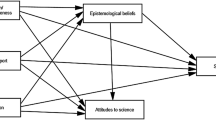Abstract
The purpose of this study is to investigate the nature of epistemological beliefs about learning (or learning beliefs) by analyzing the type of factors involved in the epistemological development of South Korean high school students (N=455). Learning beliefs are implicit assumptions held by learners about the source and certainty of knowledge and the ways to obtain knowledge. Previous studies on the epistemological development of American high school students showed that American students learning beliefs are positively related with their age, amount of formal education, and academic achievement. Multiple regression analysis of this study, however, showed that no such relationships were identified from the present South Korean sample except between students beliefs and their academic achievement. In addition, the present study showed that South Korean students learning beliefs were related with their independent-self construal (individualistic self-view) but not with their interdependent self-construal (collectivistic self-view). These results reconfirmed the culture-specific nature of epistemological beliefs which was identified from previous comparative studies with South Korean and American college students (Youn, Kim, & Yang, 1999; Youn, 2000). The differences between the present results and previous findings with South Korean college students will be further discussed in terms of the sub-cultural variations between South Korean young generations.
Similar content being viewed by others
References
Gundykunst, W. B., Matsumoto, Y. (1996). Cross-cultural variability of communication in personal relationships. In W. B. Gundykunst, S. Ting-Toomey, and T. Nishida (Eds.),Communication in personal relationships across cultures (pp. 19–56). Thousand Oaks/ London/New Delhi: Sage Publications.
Hofstede, G. (1986). Cultural differences in teaching and learning.International Journal of Intercultural Relations, 10, 301–320.
Hofstede, G. (1991).Cultures and organizations. London: McGraw-Hill Book Company.
Jehng, J. J., Johnson, S. D., & Anderson, R. C. (1993). Schooling and students’ epistemological beliefs about learning.Contemporary Educational Psychology, 18, 23–35.
Kim, H. Y. (1997).Relationship patterns among cultural beliefs, self-cohesion, self-esteem, and psychological well-being: cross-cultural models for Koreans and Americans. Unpublished doctoral dissertation. University of Missouri, Columbia.
Kim, U. C. (1995).Korean adolescent values. Academy of Korean Studies, Seoul, Korea.
Markus, H. R., & Kitayama, S. (1994). The cultural construction of self and emotion: Implications for social behavior. In S. Kitayama, & H. R. Markus (Eds.),Emotion and culture (pp. 89–130). Washington D. C.: American Psychological Association.
Perry. W. G., Jr. (1968).Pattern of development in thought and values of students in arts college: A validation of a scheme. Cambridge, MA: Harvard University, Bureau of Study Counsel. (ERIC document Reproduction Service No. ED024315.)
Rokeach, M. (1960).The open and closed mind. New York: Basic Books.
Schmidt, T. A. (1985). Older and wiser?: A longitudinal study of the impact of college on intellectual development.Journal of College Student Personnel, 26, 388–394.
Schommer, M. (1989).The effects of beliefs about the nature of knowledge on comprehension. Unpublished doctoral manuscript, University of Illinois, Urbana Champaign.
Schommer, M. (1992).Predictors of epistemological beliefs: Comparing adults with only a secondary education to adults with post secondary education. Paper presented at the Midwestern Educational Research Association, Chicago.
Schommer, M. (1994). An emerging conceptualization of epistemological beliefs and their role in learning. In R. Garner, & P. Alexander (Eds.),Beliefs about text and text instruction (pp. 25–39). Hillsdale, New Jersey: Erlbaum.
Singelis, T. M. (1994). The measurement of independent and interdependent self construals.Personality and Social Psychology Bulletin, 20(5), 580–591.
Triandis, H. C. (1994). Major cultural syndromes and emotion. In S. Kitayama, & H. R. Markus (Eds.),Emotion and culture (pp. 89–130). Washington D. C.: American Psychological Association.
Triandis, H. C. (1995).Individualism and collectivism. Boulder, CO: Westview Press.
Youn, I. (1997).The culture specificity of epistemological beliefs about learning, Unpublished doctoral dissertation. University of Missouri, Columbia.
Youn, I. (2000). The culture specificity of etpistemological beliefs about learning,Asian Journal of Social Psychology, Vol3(1), 87–105. The Asian Association of Social Psychology and the Japanese Group Dynamics Association with Blackwell Publishers, Oxford UK and Boston USA.
Youn, I., Kim, H. Y., & Yang, K. M. (1999).The impact of culture on the development of epistemological beliefs about learning. Paper presented at the third Asian Association of Social Psychology, Taipei, Taiwan, 1999, 8/4-7.
Author information
Authors and Affiliations
Corresponding author
Additional information
A paper presented at the 26th International Association of Cross Cultural Psychology, Pultusk, Poland, 2000/7/16-21
Rights and permissions
About this article
Cite this article
Youn, I., Yang, KM. & Choi, IJ. An analysis of the nature of epistemological beliefs: Investigating factors affecting the epistemological development of south korean high school students. Asia Pacific Educ. Rev. 2, 10–21 (2001). https://doi.org/10.1007/BF03024928
Received:
Revised:
Accepted:
Issue Date:
DOI: https://doi.org/10.1007/BF03024928




